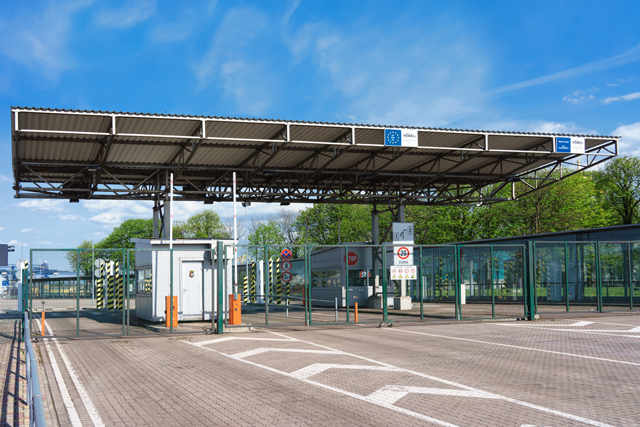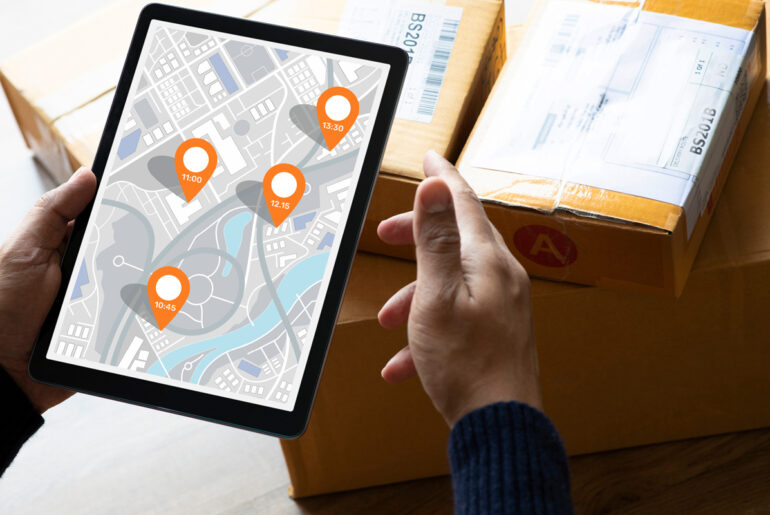When customers are waiting on crucial deliveries, meeting their timeline isn’t about adhering to instant gratification; it’s about ensuring they have the goods and resources they need, when they need them. The trouble is ensuring timely deliveries can become significantly more complex when deliveries are crossing borders between different countries — or even between states or provinces.
While border restrictions and tariffs can be difficult to navigate, the right tools and planning can put delays and issues in the rearview. But before you can overcome the challenges borders present in last-mile delivery, it’s crucial that they better understand what you’re up against.
Customs Clearance Delays
While declarations at customs can cause minor hold-ups for individuals traveling across borders, the process can be much more involved — and costly — for last-mile delivery businesses. The potential for deliveries to be held up at customs can make it extremely difficult for delivery businesses to provide accurate delivery windows. In many cases, accounting for customs can force delivery businesses to form contingency plans, reroute deliveries or expedite shipments using premium services, all of which can result in added costs.
Issues at customs can also lead to traffic jams in the supply chain. Vehicles may be kept from reentering the pool of available vehicles, while backups and congestion in the warehouse can snowball into delays of other shipments — even those that don’t need to make their way across borders.
Of course, those working in last-mile delivery already know that it’s impossible to talk about delivery days without also touching on an intrinsically linked topic: customer satisfaction. Consumers rely on fast delivery and, in today’s digital-first environment, have come to expect it as the standard. Delayed deliveries spark dissatisfaction and refund requests from customers, regardless of the reason for the delay. In industries that rely on just-in-time delivery, such as pharmaceutical and medical device production, this can be especially severe as delays can lead to service disruptions and limit the care available for end-users.
Restricted and Regulated Goods
The challenges that come with border restrictions impact virtually every industry and business that transports shipments or materials across borders. For those transporting particular goods, though, restrictions can be that much more daunting for those moving highly regulated goods.
A wide range of items — including alcohol, medical supplies and even electronic devices — are frequently subject to stricter, more specific regulations than other items. While this can vary somewhat widely based on the specifics of what’s being transported and the particular countries, states, or provinces involved, this can put last-mile delivery companies at the mercy of strict import/export laws, licensing requirements and compliance checks, often creating bottlenecks at customs.
For example, alcohol shipments often require age verification, excise tax payments and adherence to local distribution laws, while medical materials must meet stringent safety and quality standards set by regulatory bodies like the FDA or EMA. Paperwork issues, regulatory scrutiny or changes in trade policies can disrupt last-mile routing, exacerbating delays and resulting in increased costs.
Border delays can have a ripple effect for time-sensitive goods like pharmaceuticals, vaccines and medical equipment, which often depend on precise temperature control and timing to ensure effectiveness; in some cases, delays can result in complete rejection of the goods, creating financial losses for businesses and negatively impacting customer sentiment.
These challenges can be difficult to navigate, particularly when international regulations and embargoes shift with little or no warning. For many last-mile delivery businesses, leveraging regulatory technology to be prepared ahead of compliance checks and ensure proper documentation is in order ahead of shipments reaching the border.
Variable Tariffs and Fees
Just like shifting regulations can have a profound impact on last-mile delivery businesses operating across borders, changes in tariffs and fees can dramatically impact the pricing of — and even demand for — the goods affected. When new tariffs or import fees come into play, it causes direct fluctuations in the cost of goods and the costs associated with transporting them. Higher tariffs can result in increased shipping costs, in turn forcing last-mile delivery businesses to decide whether to lower their profits to absorb the added costs or pass the increases on to customers at the risk of customer dissatisfaction or even churn.
In addition to the direct financial impact, shifting tariffs can also spark changes to overall supply chain efficiency. When importing a particular product becomes prohibitively expensive, for instance, businesses may look to source products or materials from regions with more favorable trade policies — even when it means potentially longer transit times or increased complexity in planning and routing. For last-mile delivery providers, these changes can even lead to lost customers if their future plans rely on transport through countries or regions in which they don’t operate.
Carrier and Compliance Discrepancies
Even for areas in which a last-mile delivery business does operate, differences in delivery rules between locations can create significant logistical hurdles. Regulations regarding delivery times, permissible delivery methods and recipient verification vary widely not only between countries but often between different states and provinces. For example, some locations require age verification for alcohol or pharmaceutical deliveries, while others impose strict time restrictions on when deliveries can be made. Adapting to these unique requirements can lead to inefficiencies, delays and increased costs for those delivering goods, particularly when expanding into a new region or coping with recently updated rules. Additionally, compliance with different tax structures, return policies and local consumer protection laws is a must, adding more complexity to cross-border delivery.
It’s also necessary to account for different carriers operating in different areas. For last-mile delivery businesses that work alongside local courier services for delivery completion, even minor differences in technology integration and operational standards can result in confusion, delays or missed deliveries. If a last-mile delivery business has access to real-time GPS tracking in one area but not in another, for instance, it can be a major challenge to provide and meet accurate ETAs, damaging a business’s reputation in a given area.
Adhering to Data Privacy and Security Laws
Just as customer expectations have shifted along with technology’s growing role in commerce and delivery, so have consumer protection regulations. This is especially true in the way businesses, including last-mile delivery businesses, are expected to collect, store and protect consumer information. The General Data Protection Regulation (GDPR) is a strong example, issuing regulations on data privacy for those in the EU.
Delivery businesses collect and process vast amounts of sensitive information, such as names, addresses and even preferred hours for receiving deliveries. In addition to staving off significant financial penalties, adhering to all pertinent regulations within a given area helps businesses protect their customers’ privacy, maintain trust and communicate to customers that they’re putting their trust in a reliable business. Ignoring such regulations, on the other hand, can leave that data vulnerable to breaches and cyber attacks that can not only drastically impact affected customers but also obliterate a business’s reputation.
Considering modern consumers are increasingly aware of potential threats to their data’s security, it’s understandable that they expect businesses to handle their information responsibly — whether local laws require them to or not. Communicating data handling practices transparently can boost customer sentiment significantly, especially when paired with clear opt-in/opt-out options. By proactively staying ahead of regulatory changes, last-mile delivery businesses can simultaneously reduce their exposure while bolstering their customer relationships.
While each of these factors can play into a last-mile delivery business’s ability to operate efficiently across borders, the challenges they present collectively are made that much tougher to overcome by the constantly changing — and at times even volatile — nature of border restrictions, tariffs and data privacy laws. Specialty routing software can be a game-changer for users, particularly when adopted early and embraced to the fullest.
Built around a proprietary route optimization algorithm, RouteManager provides last-mile delivery businesses with a feature to set up and factor borders into routes, ensuring compliance for smoother, faster, more predictable deliveries. Schedule a personalized demo today to see how RouteManager can help you stay ahead of border restrictions and bottlenecks.




